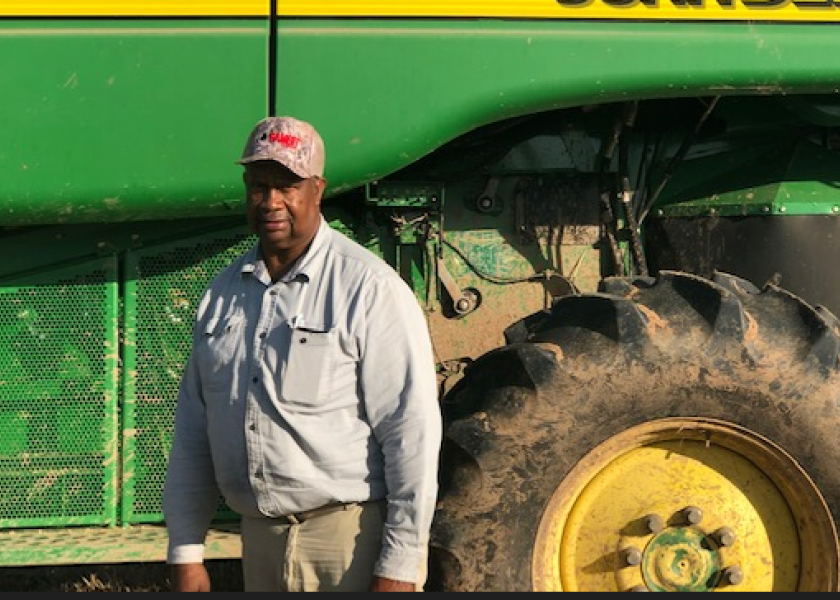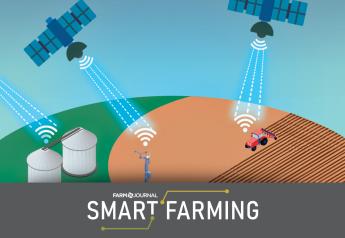How an Arkansas Farmer Found Counsel for Climate-Smart Practices to Grow the Best Crop

Editor’s note: America’s Conservation Ag Movement has embraced farmer-to-farmer knowledge transfer as a key pillar in the strategy to accelerate regenerative ag practice adoption. At the center of the farmer learning communities, exceptional farmers have stepped forward to lead these efforts in their communities. These individuals are leaders in their own innovation and implementation of practices and programs that fit for their unique farm operation and help achieve the goal of continuous improvement. This profile is part of a series of that will highlight these Conservation Stewards, their farms, and their conservation practices throughout the year.
Lawrence M. Conyer is a second-generation farmer in Pine Bluff, Ark., where he grows wheat, rice, soybeans, corn and grain sorghum on 1,500 acres. He attributes his conservation practices, including cover crops and minimum till, to his ability to manage his land to be resilient and to grow his operation at scale, and he continues to experiment with new practices to find agronomic and financial benefits for his operation.
Trust In Food: How long have you been conducting conservation stewardship practices and programs? What impact have they had on your operations?
Conyer: I started farming in 1999, when I purchased 22 acres of farmland in Jefferson County. I met a guy named Levelle Foote, who worked for NRCS. Mr. Foote talked to me about some of the practices that I could implement on my 22 acres. At that time, I had no idea the impact of being a steward of the land and how much it would help me. I had several practices installed on my land. The practices helped to enhance my property. I had a well installed, underground piping, land leveling, nutrient management, water management, cover crops, minimum till and others over the years.
The impact it has had on my operation has helped my land have better performance. It has freed up money that I could not otherwise afford at that time. Over the years I have been dealing with FSA and NRCS to help improve all of my land.
Trust In Food: What does the term “climate-smart agriculture” mean to you?
Conyer: Climate-Smart Agriculture means to me that changes have become more relevant in this century. We must take into account the growing world population to ensure all have food and security. CSA will help us managing landscapes, cropland, livestock, forests and fisheries. We must be able to reduce greenhouse gas emissions. As a row crop farmer, I am thinking about the rice, corn and wheat that I am growing to ensure the growing population food security. We as farmers must be able to increase productivity, boost income and produce more and better food to improve nutrition.
Trust In Food: What would you consider your greatest achievements or strengths? What else do you want to accomplish in the next year?
Conyer: I would say my greatest achievement so far was winning the Lloyd Wright Farmer’s Award in 2016. It was also a great accomplishment for me and my family to receive the 2017 Farm Family of the Year Award for Jefferson County in Arkansas.
Being able to obtain helpful information from NRCS, FSA, Arkansas Land and Development, and University of Arkansas at Pine Bluff. Since I am a member of the National Black Growers Council, we work together as a group of farmers to help one another to be a better farmer.
I would like to have a good crop this year, and I would like to have capital that I could spend to purchase land or buy equipment.
Trust In Food: Have they had any agronomic impact? Financial impact?
Conyer: Yes, as a farmer I am striving to always obtain information about how to grow and care for plants and soils in certain environments. There is a financial impact for farmers this year. The cost of diesel this year combined with threefold fertilizer price increases since last year means that farmers right now must be very careful of what they’re doing to break even.
Trust In Food: What other opportunities do you see on your farm or the farms around you?
Conyer: I can see opportunities being better for my farm and others by communicating with other farmers. As we learn new technologies, we need to share the information and get together occasionally to discuss problems and share ideas.
Trust In Food: What state or local organizations have helped you in identifying opportunities or helped you implement practices and programs? What other organizations are you affiliated with?
Conyer: The local and state NCRS office has helped me to start and complete various farm practices. They have helped me to reduce soil erosion and helped me achieve and maintain compliance with soil and water conservation standards.
Other organizations I am affiliated with are FSA, John Deere, Cargill, New Holland, and National Black Growers Council.
Trust In Food: What advice would you give other farmers as they continue to consider climate-positive practices? Have you had any failures or lessons learned in your journey that you learned from? What would you do differently with what you know today?
Conyer: I would advise young farmers and other farmers to have a positive attitude and be patient. Take advantage of all the Government Programs offered by FSA and NRCS. Become familiar with any other companies studying carbon footprints because certain crops that you can install on your land would help climate change and reduce carbon footprints.
I have had a lot of failures but somehow, I just kept coming back. I didn’t let obstacles stop me from trying again.
I would work more with NRCS and become familiar with all the programs they have to offer farmers so I can make the best decisions in producing a good crop.







